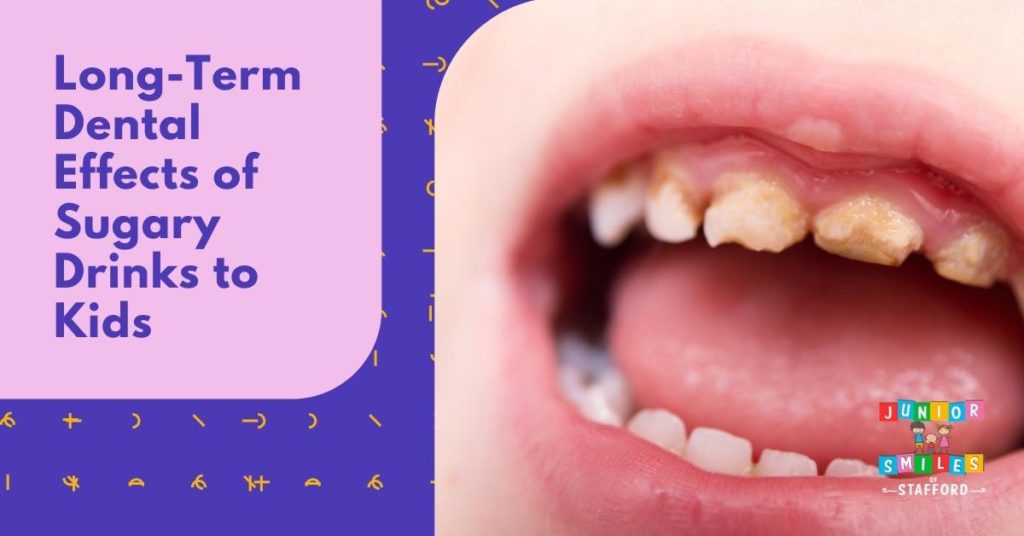Understanding the Impact of Sugary Drinks on Kids’ Teeth

Understanding the crucial impact of sugary drinks on children’s dental health is more important than ever. Sugary beverages, a staple in many kids’ diets, are not just a treat; they play a significant role in tooth decay. This blog post will talk about sugar tooth decay and the broader effects of sugary foods and drinks on dental health. Moreover, we will offer practical tips for preventing sugar-related damage, ensuring your child’s teeth remain healthy and strong. Keep on reading to know more.
How Sugar Contributes to Tooth Decay
Sugar, often a hidden culprit in many of our favorite snacks, plays a huge role in the development of tooth decay in children. When these sugary substances come into contact with the bacteria in the mouth, they initiate a process of acid formation. This acid is responsible for eroding the enamel, the tooth’s hard protective layer. Frequent exposure to these acids, especially in children, increases the likelihood of cavities. The reality is that even seemingly harmless foods and beverages can contribute to this cycle of decay. That’s why knowing the importance of understanding the effects of sugar on dental health and the food containing it is crucial, so you know which ones your child should avoid.
Effects of Sugary Food and Drinks on Dental Health
It’s normal for kids to want to munch on sweet food. However, sugary food and drinks can harm your child’s teeth, especially when consuming too much.
Acceleration of Tooth Decay
Sugary foods and drinks can significantly accelerate the process of tooth decay, especially in children. When sugar interacts with bacteria in the mouth, it produces harmful acids that attack tooth enamel. This continuous assault leads to the weakening and eventual erosion of the enamel, making teeth more susceptible to cavities. This is especially the case for kids who don’t have a proper oral hygiene routine.
Promotion of Gum Disease
Consistent consumption of sugary products not only affects the teeth but also the gums. These sugars create an ideal environment for harmful bacteria, which can lead to bottle rot, gum disease, etc. When your kid has prolonged exposure to sugary diets increases the risk of developing more serious dental issues, including periodontal disease.
Increased Risk of Tooth Sensitivity
Frequent consumption of sugar can lead to increased tooth sensitivity. As enamel erodes and dentin gets exposed, teeth become more sensitive to hot, cold, and sweet foods, causing discomfort and pain for your kid. Hence, they will have a hard time eating.
Long-term Dental Problems
The effects of sugary foods and drinks extend beyond immediate dental health issues. Over time, these dietary habits can lead to more severe and chronic dental problems. Frequent sugar intake can result in a persistent state of acid attack on teeth, leading to chronic enamel degradation, cavities, and possibly even tooth loss if left unchecked.
Preventing Sugar-Related Damage to Kids’ Teeth
Dental care for kids is paramount, and you should start encouraging your kid to have a good oral routine at a young age. Below are some tips to prevent damage to your child’s teeth.
Limiting Sugar Intake
A fundamental step in preventing sugar-related damage to kids’ teeth is to limit their sugar intake. This doesn’t mean cutting out sugar entirely, but rather being mindful of the quantity and frequency of sugary foods and drinks in their diet. You may give your child a candy every once in a while, but don’t make it a habit to reward them with these sweets.
Offer Healthy Snack Alternatives
Offering healthy snack alternatives to sugary food and drinks can greatly reduce sugar-related dental issues. Snacks like fruits, vegetables, and cheese are not only nutritious but also less likely to contribute to tooth decay. In order to motivate your child to snack on healthy alternatives, pick their favorites and turn it into something they can munch on, like a popsicle.
Encourage Good Oral Hygiene
Teaching kids about the importance of good oral hygiene from a young age is essential. This includes brushing twice a day, flossing regularly, and using fluoride toothpaste to strengthen teeth. You should also set an example for your child to follow, as they copy everything they see around them.
Educate Your Child on Sugar’s Effects
Educating children about the effects of sugar on their teeth can empower them to make healthier choices themselves. Understanding the consequences helps in developing a more mindful approach to consuming sugary products. If they know the harmful effects of sugar on their teeth, they’ll be more likely to say no to them.
Schedule Regular Dental Checkups
Regular dental checkups are crucial. These visits allow for early detection of any dental issues and provide an opportunity for professional advice tailored to your child’s specific dental needs. Schedule a regular checkup for your child and start at a young age, so they’ll become more accustomed to frequent dental appointments.
Ready for a Brighter Smile? Visit Junior Smiles of Stafford Today
Understanding and mitigating the impact of sugary drinks and foods on kids’ teeth is crucial for their long-term dental health. By embracing practices such as limiting sugar intake, promoting healthy snacks, encouraging good oral hygiene, and educating children about sugar’s effects, you can play an important role in preventing dental problems. Remember, the journey to healthy teeth is a combined effort of home care and professional guidance. Thus, it’s always best to consult your pediatric dentist in Stafford, VA for your child’s optimal dental health.
If you’re looking for the best dentist who knows exactly how to treat cavities and prevent them, look no further than Junior Smiles of Stafford, VA’s leading pediatric clinic. Our team is dedicated to providing the best dental care, ensuring your child’s smile stays bright and healthy. Schedule an appointment today and take the first step towards safeguarding your child’s dental future.

